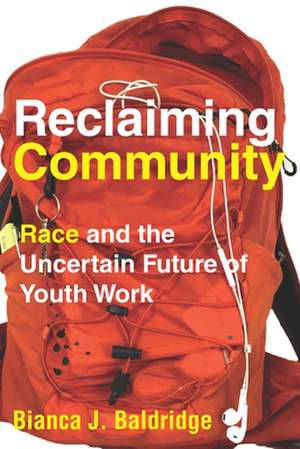Reclaiming Community – Race and the Uncertain Future of Youth Work
Autor Bianca J. Baldridgeen Limba Engleză Paperback – 27 mai 2019
| Toate formatele și edițiile | Preț | Express |
|---|---|---|
| Paperback (1) | 174.55 lei 3-5 săpt. | |
| MK – Stanford University Press – 27 mai 2019 | 174.55 lei 3-5 săpt. | |
| Hardback (1) | 648.32 lei 6-8 săpt. | |
| MK – Stanford University Press – 27 mai 2019 | 648.32 lei 6-8 săpt. |
Preț: 174.55 lei
Nou
33.40€ • 36.27$ • 28.06£
Carte disponibilă
Livrare economică 02-16 aprilie
Specificații
ISBN-10: 1503607895
Pagini: 280
Dimensiuni: 152 x 229 x 15 mm
Greutate: 0.43 kg
Editura: MK – Stanford University Press
Cuprins
Chapter 1 introduces readers to Educational Excellence, its history, mission, triumphs, and challenges. Major themes of the book, its goals, the research methodology, and its significance to sociology of education are presented. The story of the organization is discussed within a broader theoretical discussion of market-driven education reform, race, and paternalism to (1) explore the dialectical relationship between community-based spaces and schools and (2) to explore how political imaginings of race and youth shape and inform the construction of community-based educational spaces engaging Black and other minoritized youth.
Chapter 2 describes the history of Educational Excellence and its transformation from a strict after-school academic program steeped in deficit rhetoric to a comprehensive program that includes emotional and social support as well as political education. This chapter discusses the competing framing (asset-based versus deficit) of Black youth among the organization's founder, board members, and current and new staff members in the program and the struggle to reimagine Black youth beyond deficit narratives rampant in the youth development and nonprofit funding world. This chapter discusses how neoliberal restructuring affects the neighborhood Educational Excellence calls home and the schooling experiences of youth in the program. This chapter examines how youth workers become critical advocates and intercessors on behalf of students, assisting them in navigating difficult school, family, cultural, and social barriers.
This chapter examines how Black youth within after-school support spaces are often framed politically as "broken" and in need of "fixing." This chapter highlights the voices of youth workers as they navigate community-based educational youth work in a national education climate and with new organizational leadership marked by education reform and therefore pressure to frame Black youth from a deficit perspective to compete for funding opportunities, political praise, and public recognition. This chapter describes how the common trend toward deficit framing is linked to the current neoliberal education market, which incentivizes community-based educational spaces to frame marginalized youth as socially, culturally, and intellectually deficient in order to successfully compete with charter schools for funding.
Chapter 4 discusses the growing racial, class, and gender tensions between the organization's founder, executive leadership, and Educational Excellence's board members. This chapter examines the changing nature of leadership in the organization and its impact on the practices of youth workers, shifting priorities of the program, and the overall culture of the program. Rapid growth and increase in the number of youth "served" by Educational Excellence became the new language and mode of operation for the organization. Under these new logics, racial and economic discourse about Black youth and educational opportunity within the organization began to drastically disrupt life at Educational Excellence. This chapter discusses how Educational Excellence expanded into another neighborhood without the proper infrastructure, which shifted the organization in an entirely different direction¿one that led to damaged relationships and altered the reputation of the organization.
After a mass exodus of staff members at Educational Excellence, this chapter discusses how remaining youth workers strive to maintain strong and relevant pedagogical practices, familial-like culture, and an asset-rich ideology of youth in a new climate where organizational leadership is primarily concerned with funding, expansion, and greater exposure for the organization¿without regard for the consequences for staff or student morale. This chapter discusses the ways that the camaraderie and relationships established between youth workers served as an anchor for accountability in the program. With relationships in jeopardy, accountability for resisting racist and deficit language withered and neoliberal expansion flourished under new leadership.
Chapter 6 examines the external pull factors (broader political and economic forces shaping public education) and internal push factors (competing frames of race, control, and paternalism between staff, the founder, and new leadership) that led youth workers away from Educational Excellence. Youth workers share their process for leaving the organization, what they learned during their time in the program, and reflections on challenging and rewarding experiences. Chapter 6 investigates the persistence of racism and neoliberalism within the current era of education that is eroding liberatory community-based spaces engaging Black youth.
The conclusion summarizes major research findings and highlights the major triumphs, challenges, and changes the book documented. Within this chapter, the story of Educational Excellence is placed within a historical context of activism in Black communities. Through the lessons learned from Educational Excellence, a path is laid out for community-based leaders and educators of color to identify, name, and resist the complex dynamics of racism, anti-Blackness, and politics threatening their work with youth. The conclusion lays out recommendations that include (1) encouraging more scholarship that theorizes social location of community-based youth work and the deep pedagogical work that can occur within community-based after-school spaces; and (2) considering the potential effects of macroeconomic and social policies, such as education privatization, on after-school community-based spaces and cautioning against the erasure of self-determination within community-based spaces as a result of the neoliberal turn.
